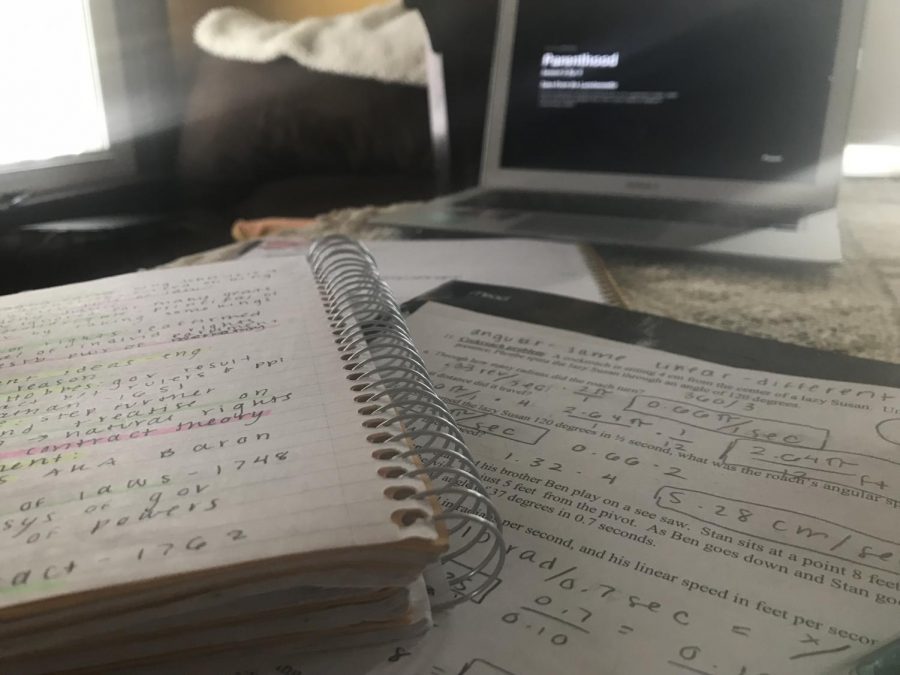How to: not procrastinate
Tired of leaving your assignments until the last minute to start? WSS has some tips to help you kick that bad habit.
Procrastination can greatly increase though watching Netflix while working on homework.
Procrastination is something that plagues people all their lives, so recognizing and changing the habit now could not only save you from pulling a couple of all-nighters in college, but also completing larger life goals.
Oh, it’s only five o’clock, and I only have a couple things to do. It should be fine if I do it later. I can just wake up early and do that. My essay is due Wednesday? Perfect, I’ll just free up my Tuesday night.
We’ve all had similar thoughts, whether it’s procrastinating a whole essay or just a worksheet. The big problem with procrastination is you may quickly realize an assignment is going to take much longer than you had originally planned for. Before you know it, it’s twelve o’clock, and oh crap, you just remembered there is a reading quiz tomorrow that you have done nothing to prepare for. While I can’t cure your procrastination–that would be pretty darn difficult–but I can offer some tips to help you complete your to do list faster than ever before.
Homework
Step 1: Clear a space for yourself where you are comfortable and there is sufficient lighting. This makes it so you can lay out all of your worksheets, books, etc. and get started with much more ease. Decorating the space to your taste and having a nice comfy chair will raise your motivation as well. (Side-note: leaving your textbook in another part of the house encourages procrastination because you usually won’t want to get up until you absolutely have to, so try to get all your materials in one place.)
Step 2: This may just be me, but I really enjoy making lists, and that includes making to-do lists. I always write a checklist on a small whiteboard, and it is very satisfying to check off all the boxes. A lot of people may enjoy writing in cursive fonts in aesthetic-looking journals, and others may just like putting a list on Notes in their phone. Hey, whatever floats your boat, man; just make a list. I think most of us like to feel as if we’re actually getting something done, so the physical action of crossing something off helps motivate us to continue. (Y’know, it’s like when you were younger and you finally figured out two plus two equals four and your teacher rewarded you with a sticker–the best feeling ever.) Creating a physical list also makes it easier to remember everything you have to do, especially if you go period by period to figure out your assignments.
Step 3: Just do it. That’s right. Listen to Nike and Shia Labeouf, no matter how much you don’t want to. Often, I will try to get one assignment done immediately and then I’ll take a break for a snack. However, please do not take this opportunity to start watching Netflix. You will likely get sucked into a half-hour episode and won’t be able to refuse yourself another after that. Instead, just take a moment to think about the day and let your thoughts wander. (Try not to go on social media or group conversations either–save that for later. Some other options would be watching a short YouTube video or just jamming out to some music.) After you get that initial assignment done, it’s usually not too hard to keep going.
Additional Tips: Don’t save the longest or most difficult assignments for last. It will be very painful to do all of them in succession–it’s much better to sprinkle in the light work between larger assignments.
Stop doing homework in your bed, it may be comfy but it lowers your productivity significantly. Since it’s a small work space, it will take much more time to find any materials you’re looking for. According to an article by the American College of Healthcare Sciences, doing your homework in bed can also make it harder to fall asleep later, so a desk will be a much better choice.
Leave your phone on do not disturb. Seriously.
Breaks are fine, just as long as they are short. Ten to fifteen minute breaks after completing a couple of assignments can probably help you get your work done faster. We get tired and our ability to focus weakens, so taking breaks can clear your mind for any more work you have to do. Staying on top of homework is similar in a way to losing weight. Letting yourself have small snacks is fine, it makes it less likely you will binge-eat out of hunger.
Come up with a motivation for yourself. I want really good grades and a high GPA because I enjoy being able to tell my parents how I did. That’s my motivation, but maybe you want to be able to brag to your friends that you scored this way or perhaps there’s a college you really want to get into. Brainstorm what would motivate you to work harder, and then remind yourself of that every time you’re thinking about procrastinating. (Another smaller method of motivation is to only let yourself eat a snack or eat dinner after you have completed all or most of your homework.)
Goals
Tip 1: If you have a diary or just a journal, fully writing down your goal will help you out. Break it down into smaller parts and how you can start completing those. To accomplish any goals, you’ll have to take baby steps. For example, if you want to lose weight, break it down into two categories: Diet and Exercise. And then from there make subgroups, lists or smaller goals under each category. You’ll find it much easier to accomplish small objectives rather than to drastically change something.

Tip 2: Do it with a friend. If you have a friend who really wants to fulfill the same goal as you, then it will make it ten times easier to get done. You will help motivate each other to complete the small things and you will have someone to ask questions or have fun discussing it with. You can also make it a challenge to see who has done better by the end of each week.
Tip 3: Try to do something to work towards the goal every day. This definitely depends on what your goal is, but generally this tip could work. A couple examples are if you’re trying to learn another language or improve a certain technique in a sport. If you’re learning a language you could assign yourself something different to do each day, and then stick to that schedule. For instance, Monday could be vocabulary, Tuesday could be a new grammar topic, Wednesday review, etc. If you’ve been wanting to learn a new technique in say, tennis, then ask someone who knows how to do it and designate ten minutes after practice every day to do it with them. Overall, just try to set aside time to accomplish your goal, and doing at it a particular point of the day, every day, will help establish it as a habit.
Tip 4: Like I said before with homework, think of something to motivate you. Maybe you’ve been procrastinating on getting a summer job. Well if you ever want to buy that camera, or those shoes, then you better start making some money. You don’t particularly enjoy a certain math class, but you know that if you pay attention and study, then you could do well on the SAT or ACT and get into the college you want. Just remember the end result you’re looking forward to and it will help motivate you. (Putting up a picture on your door of what you want, or someone who has accomplished your goal will help you remember what you’re working towards as well.)
Hopefully my advice will help accomplish any goals or New Year’s resolutions you may have, but it all really comes down to your personal motivation. However, I would also like to say that you should not believe the quote “time not spent is time wasted.” I think it’s also very important to just take some time to relax, set goals that you can accomplish without feeling an overwhelming amount of stress.
Your donation will support the student journalists of West High School. Your contribution will allow us to purchase Scholarship Yearbooks, newsroom equipment and cover our annual website hosting costs.

Kristina Rosebrook is a senior at West High and this is her third year on staff. She is the Online and Broadcast Entertainment Editor. If she isn't busy...

Fenna Semken is a senior at West High. It is her third year on staff and she is Online Editor-In-Chief this year. When she isn't working...



